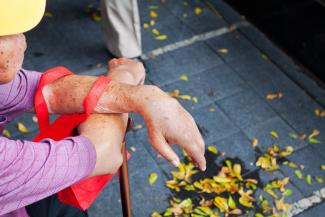
Singapore, 30 July 2020 (Thursday) - Worldwide, the COVID-19 pandemic has jolted the daily lives of many. Particularly during the circuit breaker period which took effect from 7 April, Singaporeans have had to adapt quickly to a new normal, with some doing better than others, most notably the older adults.
The Centre for Research on Successful Ageing (ROSA), a research centre based in Singapore Management University (SMU) has undertaken a study to understand possible impacts on elderly Singaporeans, so that further assistance may be provided to them in the future.
Using collected data from the Singapore Life Panel (SLP), the study explored a wide array of topics to uncover the effects of COVID-19 and government responses on the attitudes, behaviour, and well-being of older adults in Singapore within the social, economic and mental health domains. Additionally, findings were contrasted between respondents of different socioeconomic and education levels, leading to a more robust discussion of policy implications for different vulnerable groups. Data was collected from a population representative monthly survey with a monthly response rate of about 7,500 respondents, tracking the lives of Singaporeans aged 55 to 75.
Objectives of the study
- To evaluate the effectiveness of government interventions to-date
- To uncover gaps in current policy measures
- To recommend untouched avenues for executing future policies
Professor Paulin Straughan, Director, Centre for Research on Successful Ageing said “We embarked on this study to understand the factors that shape the well-being of the elderly who are not agile financially, nor technology savvy. With the findings, we hope that policies implemented can be better shaped to ensure older Singaporeans recover quickly and those who require more assistance are able to find the appropriate avenues for help. This is especially important for older adults who live alone or are from low socio-economic status (SES) households, as they experience declines more than those who stay with others or are from high SES households.”
The study identified 3 core areas that could be further improved to enhance the well being of the elderly:
- Financial assistance for those from low-socioeconomic status households
- Mental health support for those who live alone and are socially isolated
- Measures to plug technology gaps and help seniors adapt to digital transformation
At present, several government initiatives are in place to ease concerns about the needs of elderly Singaporeans, such as the Ministry of Social and Family Development (MSF)’s National Care Hotline, where individuals can seek guidance on mental health challenges they may be facing, and the Infocomm Media Development Authority (IMDA)’s Seniors Go Digital Movement which promotes digital literacy.
In view of ROSA’s study findings, representatives from the Prime Minister’s Office, Ministry of Health, Ministry of Education, Ministry of Culture, Community and Youth, Ministry of Trade and Industry, Ministry of Social and Family Development, Ministry of Manpower, Central Singapore CDC, and the National Volunteer & Philanthropy Centre (NVPC) have been invited to convene in August to assess COVID-19 policies implemented, look into the strengthening of current initiatives, and the development of possible new approaches to tackling issues experienced by the elderly population.
Please refer to Annex for summary findings.
For full findings and graphics, click here.